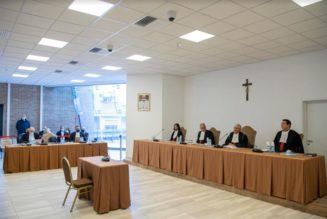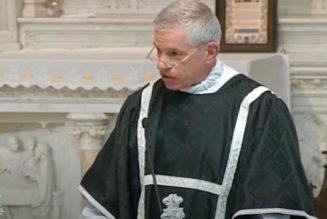The Catholic Church in Belgium has said it will fight an order to erase an entry in a baptismal register, amid a reported rise in “debaptism” requests.
A spokesman said that the Church had appealed a Dec. 19 decision by Belgium’s Data Protection Authority requiring the Diocese of Ghent to comply with an unnamed person’s request to have the record of their baptism deleted.
When a Catholic asks to be “debaptized” in Belgium, the request is noted in the margin of the baptismal register of the parish where they were baptized, but the baptismal entry is not deleted.
The Catholic Church teaches that “baptism seals the Christian with the indelible spiritual mark of his belonging to Christ.” While a person can lapse in the practice of the faith, or even renounce it altogether, it is impossible to reverse the effects of baptism.
The Belgian data protection authority gave the Church 30 days to appeal against its ruling, which could potentially go on to serve as a precedent not only in Belgium but also in the other 26 member states of the European Union.
The Catholic Church in Belgium said that the decision raised “many legal questions” and “should be examined at the European level.”
It added that it would continue to use the current procedure of adding a note to baptismal records, as the dispute heads to the Market Court, a section of the Court of Appeal in Brussels with exclusive jurisdiction over the law relating to the Data Protection Authority.
The Church in Belgium cited a February 2023 ruling by the Data Protection Commission in Ireland, a country that also belongs to the EU.
The Irish commission said that people who “no longer consider themselves to be members of the Catholic Church do not have the right to obtain erasure of their personal data” in baptismal registers.
The Irish authority reviewed requests for erasure from baptismal records in the Archdiocese of Dublin, based on Article 17 of the General Data Protection Regulation (GDPR), which has applied throughout the EU since 2018.
The commission said: “In circumstances where a data subject no longer wishes to be a member of the Catholic Church, a supplementary statement could be added by the archbishop to the baptism register entry stating ‘No longer wishes to be identified as a Roman Catholic.’”
The Belgian case emerged after an individual asked the Ghent diocese to delete their data from all files, including the baptismal register. When Church authorities explained that a note would be written beside their baptism record, but it would not be erased, the person complained to the Data Protection Authority.
The data authority said that the Church argued it was necessary to preserve baptismal records to prevent possible identity fraud, for example, if a person who was already baptized sought to receive the sacrament for a second time, in contravention of Church teaching.
The data authority recognized the Church’s concern, but argued that the complainant’s interests took precedence over those of the Church.
“As a result, the data processing in question is deemed unlawful, which means that the complainant can exercise his or her right to have the data deleted,” it said.
Geert De Kerpel, spokesman for the Archdiocese of Mechelen-Brussels, which includes the Ghent diocese within its ecclesiastical province, said: “We were very surprised by the decision, as the data protection authority in Ireland had reached the opposite decision only a few months ago in a complaint against the Archdiocese of Dublin.”
“So we think there are enough arguments to defend our position in court.”
He added: “Our staff and volunteers in the dioceses and parishes treat all applications with care. We thereby recognize the demand of those who want to explicitly distance themselves from the Church, even if it does take some time and research to get everything done.”
The Church in Belgium adopted the policy of adding a note to baptismal registers in the 1990s, when it first began receiving requests for “debaptism.”
In 2021, the Church in Belgium reported a sharp rise in the number of people asking to be recorded as “debaptized.”
The Church’s annual report said there were 5,237 such requests in 2021, compared to 1,261 in 2020 and 1,800 in 2019.
The report suggested that the Vatican doctrine office’s March 2021 statement that the Catholic Church does not have the power to bless same-sex unions might “partly explain” the spike in requests.
The number of “debaptism” requests fell significantly in 2022, to 1,270. But officials fear that the figure will have risen again in 2023, following the screening of the documentary series “Godforsaken,” which prompted nationwide outrage when it was aired in Belgium in September last year.
The series, which highlighted clerical abuse and cover-ups, triggered a parliamentary inquiry and reportedly prompted a surge in Catholics leaving the Church.
In a Sept. 18 op-ed in Belgium’s De Standaard newspaper, the writer and political official Jan De Zutter argued that the GDPR had reined in the internet giant Google and should do the same for the Church.
“The Church fears it like the devil fears holy water when confronted with the GDPR,” he claimed. “It uses all kinds of theological and ecclesiastical arguments for this and invokes religious freedom.”
Kathleen Van Brempt, De Zutter’s colleague and a member of the European Parliament, submitted a parliamentary question to the European Commission Sept. 20, asking what steps it intended “to take to enforce religious organizations’ compliance with the GDPR and to ensure data protection for European citizens.”
Other EU countries have seen unsuccessful challenges to the Church’s practice of declining to delete baptism records.
In 2014, the Court of Cassation, the highest court in the French judiciary, rejected a man’s request for the deletion of his baptismal entry in a parish in northern France.
In 2021, Slovenia’s Administrative Court confirmed that there was no right to the deletion of personal data from baptismal registers under Article 17 of the GDPR.
In contrast with Belgium, a mechanism in neighboring Germany allows baptized Catholics to renounce their membership of the Church, which is linked with a requirement to pay a church tax.
If a baptized Catholic wishes to exit the Church in Germany, they must book an appointment at a local civil registry office or court, provide official documents, and pay a fee of around $35. In return, they receive a certificate confirming they are no longer registered and therefore not liable for the church tax.
This step triggers a letter from local Church officials, describing the implications of the move, which include a bar on receiving sacraments, holding Church posts, and acting as a baptismal or confirmation sponsor.
A record 522,821 people formally left the Catholic Church in Germany in 2022 — more than 400 times as many as requested “debaptism” that year in Belgium, whose population is around 12 million, compared to Germany’s 83 million.
Comments 45
Services Marketplace – Listings, Bookings & Reviews






